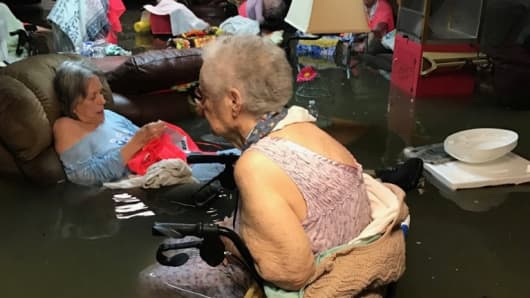
Hurricane Harvey’s floodwaters have taken a toll on health-care facilities in southeast Texas, and it could take weeks if not months for some of the area’s major medical centers to recover.
“Over 20 healthcare facilities, including hospitals, nursing homes, assisted living centers and others have been evacuated. Another two dozen … announced that they were on ‘internal disaster status,'” but are still treating patients, said Darrell Pile, CEO of the Southeast Texas Regional Advisory Council, which has been coordinating the disaster response in the region.
With waters beginning to recede in areas south of Houston, Pile says that most area hospitals should be able to get staffing back to normal and supplies in place over the next few days.
“I anticipate that at least 90 percent of our health care facilities will be back in service within one month,” Pile said.
HCA Healthcare is one of the largest for-profit hospital operators in Texas, with facilities accounting for more than a quarter of its business in the region.
By late Tuesday, its facilities in Corpus Christi had reopened, a spokesman said, but two of its Houston-area hospitals were still affected by flooding. He described the damage as minor.
“The evacuation of Bayshore Medical Center’s most critical patients has been completed, and further evacuation has been suspended, though we will continue to assess the situation,” said Ed Fishbough, spokesman for HCA. “East Houston Regional Medical Center, which was evacuated before the storm, remains closed.”
Nearly 10 percent of Community Health Systems’ hospital operations are located in the area affected by Harvey. The company says five of its hospitals were affected this week, with two facilities in Victoria, 120 miles southwest of Houston, in the direct path of the storm.
DeTar Hospital North is expected to remain closed through next week, but its sister facility DeTar Hospital Navarro is expected to resume full operation by week’s end.
“Water and power were major challenges, and DeTar loaned CHS’ back-up mobile generators to the City of Victoria which allowed restoration of the city water supply for residents as well as DeTar Hospital Navarro and the county-owned hospital,” said Rebecca Ayer, spokeswoman for Community Health Systems, in a statement.
LifePoint Health says its facilities in south Texas were not affected by the storm surge following Harvey and are operating normally.
“Our facilities in Louisiana, however, are bracing for the continued impact of the storm. They are currently open, operating and are well prepared to treat patients and support the community,” said Michelle Augusty, spokeswoman for LifePoint Health.
Analysts estimate the closures could impact patient volumes into the next quarter for hospitals in the Houston area. After past storms in Louisiana and Texas, the major hospital operators saw between 1 and 5 percent declines in revenues.
Hurricane Harvey has hit at a time when hospital admissions growth is already down.
“Houston is a really important market for them,” said ratings analyst Jessica Gladstone, a vice president with Moody’s investor service, in a note to clients.
“Patient volumes are going to be way down, but there’s also going to be a lot of extra costs,” for cleanup, she said. “Even though it’s 5 to 10 percent of their overall revenues, we’re going to see it in the results.”
But the lowered volumes are likely to be temporary, given that most of the public hospitals were well-prepared for the storm and those that had to evacuate patients did so without incident.
“The market usually looks through hurricane impact on results, so long as the issues do not result in the kind of patient care issues we saw with Katrina,” noted Mizuho director of research Sheryl Skolnick in a report to clients, “even if it takes weeks to get the hospitals back on track for normal levels of volume and activity.”
Pile said Houston hospitals learned a lot from prior Texas storms and New Orleans’ experience during Katrina.
“I can’t say enough about the role of preparedness and responders,” which is possible in part because of the federal hospital preparedness program due to be renewed by Congress, Pile said.
“It’s at risk to have funds reduced. I hope that Texas can become a model and demonstrate why those funds continue to be needed,” he said.
[ Source : cnbc ]










